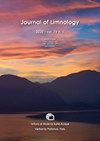Lake-wide assessment of trace elements in surface sediments and water of Lake Sevan
IF 1.1
4区 环境科学与生态学
Q4 LIMNOLOGY
引用次数: 2
Abstract
Lake Sevan (Armenia) is one of the large freshwater high-mountain lakes of Eurasia. Detailed information about the extent and fate of trace elements on lake sediment and water quality has not been published yet. For this reason, surface sediment and water samples were collected from the southern and northern basins of Lake Sevan to determine trace element concentrations and assess the trace element behaviour. Geo-accumulation index, potential ecological risk index, and hazard index were calculated to estimate the environmental risk potential. In comparison to reference values, the investigated sediment samples contained elevated concentrations frequently for V, Cr, Co, Ni, Mo, Cd, Be, Ti, Rb, Sr, Se, Hf, and Th and occasionally for Cu, As, Li, B, Ag, Sb, Tl, Bi, U, La, Ce, Pr, Nd, Sm, Eu, Gd, Tb, Dy, Ho, Er, and Tm. An overall potential ecological risk posed by all the investigated trace elements in the sediments was assessed to be moderate-considerable, however, Mo, Hg, and Cd were the elements with the highest ecological risk potential. The two basins of the lake showed significantly different behaviour according to the investigated trace element contents in the sediments to be higher in the bigger basin compared to the smaller basin. In comparison to reference concentrations in water samples according to the use of the adapted geo-accumulation index, elevated values for Ti, Cr, Cu, Cd, and Pb were observed. Elevated concentration was also observed in the case of B in nearly all water samples in comparison with literature values. Nevertheless, several water samples can be seen as not strongly anthropogenic influenced by Co, Ni, Sn, Sb, Ag, Hg, and Bi. The concentrations of trace elements in the lake water caused health risks to humans particularly children in the case of lake water used for drinking purposes, moreover, As was the main element posing health hazards. The results point out further attention to the sources of elevated trace elements in Lake Sevan, including anthropogenic influences and geological characteristics.塞万湖表层沉积物和水体中微量元素的全湖评价
塞万湖(亚美尼亚)是欧亚大陆最大的高山淡水湖之一。关于湖泊沉积物和水质中微量元素的范围和去向的详细资料尚未发表。因此,从塞万湖的南部和北部盆地收集了地表沉积物和水样,以确定微量元素的浓度并评估微量元素的行为。计算地质累积指数、潜在生态风险指数和危害指数,估算环境风险潜力。与参考值相比,所调查的沉积物样品中V、Cr、Co、Ni、Mo、Cd、Be、Ti、Rb、Sr、Se、Hf和Th的浓度频繁升高,Cu、As、Li、B、Ag、Sb、Tl、Bi、U、La、Ce、Pr、Nd、Sm、Eu、Gd、Tb、Dy、Ho、Er和Tm的浓度偶尔升高。沉积物中所有微量元素的潜在生态风险总体为中等-相当程度,其中Mo、Hg和Cd的潜在生态风险最高。两流域沉积物微量元素含量表现出明显的差异,大流域沉积物中微量元素含量高于小流域。与水样中的参考浓度相比,根据使用适应性地积累指数,观察到Ti, Cr, Cu, Cd和Pb的升高值。与文献值相比,在几乎所有水样中也观察到B的浓度升高。然而,一些水样可以被认为没有受到Co, Ni, Sn, Sb, Ag, Hg和Bi的强烈人为影响。湖水中微量元素的浓度对人类,特别是供饮用的湖水对儿童造成健康风险,此外,砷是构成健康危害的主要元素。结果表明,塞万湖微量元素含量升高的来源包括人为影响和地质特征。
本文章由计算机程序翻译,如有差异,请以英文原文为准。
求助全文
约1分钟内获得全文
求助全文
来源期刊

Journal of Limnology
地学-湖沼学
CiteScore
2.70
自引率
6.20%
发文量
12
审稿时长
3 months
期刊介绍:
The Journal of Limnology publishes peer-reviewed original papers, review papers and notes about all aspects of limnology. The scope of the Journal of Limnology comprises the ecology, biology, microbiology, physics, and chemistry of freshwaters, including the impact of human activities, management and conservation. Coverage includes molecular-, organism-, community-, and ecosystem-level studies on both applied and theoretical issues. Proceedings of workshops, specialized symposia, conferences, may also be accepted for publication.
 求助内容:
求助内容: 应助结果提醒方式:
应助结果提醒方式:


